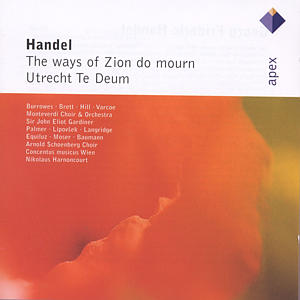Since the demise of Teldec and Erato, their
parent company Warner has ruthlessly exploited their back catalogue. While
this is mainly a cause for lament, it has resulted in some of the
lesser-known recordings being reissued. Here we have two of the greatest
pioneers of the period instrument revolution turning their attention towards
Handelís grandest church music composed for the British Royal Family.
Unfortunately, Nikolaus Harnoncourt has
never shown much natural talent as a Handel interpreter despite his status
as the Godfather of Early Music. This performance of the ĎUtrechtí Te Deum
is strictly for completists only, and features clumsy choral singing,
unpleasant solo contributions, and an unmemorable management of the
performance that does not reveal much sympathy for the Handelís musical
aesthetics. While Harnoncourtís Teldec recordings of Belshazzar,
Alexanderís Feast, and Ode to St. Cecilia all have more virtues
than vices, this uncomfortable performance sadly has to be filed under
Ďtried but failedí category that also blights Harnoncourtís Saul,
Samson, Theodora, and Jephtha.
Gardinerís patchy 1970s recordings do not
compare with his subsequent landmark performances using period instruments.
The ways of Zion do mourn, composed for the funeral of Queen Caroline
in 1737, is Handelís most unfairly neglected choral masterpiece. It has
suffered from its unwieldy inclusion in Handelís 1738 original version of
Israel in Egypt, and is much better heard as an anthem in its own right.
Although several recordings of its revised Israel in Egypt version
exist, Gardinerís recording remains the most high profile of the original
composition after more than 25 years, and I wonder what he would make of the
work if he could perform it again.
This 1978 recording shows that this early
incarnation of the Monteverdi Choir had its moments. Gardiner was to switch
across to period instruments and become an early music apostle within months
of this being recorded, and it is surprising that this is essentially a very
traditional performance. The orchestra lays it on thick, and speeds are
broad and expansive (i.e. mostly too slow). There is perhaps too much
subtlety and choral society-isms from the pre-HIP Gardiner, and some of the
grander moments sound closer to the 1940s than Gardinerís own work a decade
later. The soloists Ė quite apart from the fact that they have no place in
this work Ė fulfill their function without being especially memorable.
The ways of Zion do mourn is such a fine masterpiece that I enjoyed this
performance anyway, but I wonder if Gardiner himself would be happier had
Warner kept this one buried in the vault. It certainly deserves a
first-class recording by a group comparable to the modern-day Monteverdi
Choir, and also needs to be performed entirely chorally without spurious
assignations of certain movements to solo quartet. I am glad to have heard
this reissue, but eagerly anticipate the anthem getting the attention Ė and
the performance - it deserves.


